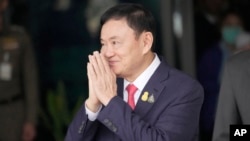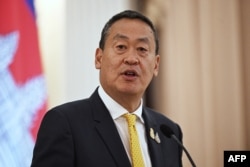Thaksin Shinawatra, the billionaire ex-premier once at the center of Thailand’s political divisions, is poised to be freed from a police hospital within days, after he was granted parole just six months after returning to the country from a 15-year self-exile overseas.
The 74-year-old Thaksin faced an eight-year jail term but was given a royal reprieve shortly after his return to Thailand on August 22, which slashed his sentence to one year.
He could be released as soon as this weekend after qualifying for parole, Justice Minister Tawee Sodsong told reporters Tuesday.
“The parole committee has approved Thaksin [as one of the prisoners] eligible for parole due to his health and age and after completing one third of his sentence,” he said, without elaborating on the conditions of his looming release.
Thaksin’s rehabilitation from fugitive archenemy of the royalist establishment to a free man is a sign of the new alignment of power in Thailand, experts say, ending a nearly two-decade tug of war between the Shinawatra clan and the royalist elite, which includes the army, big business and palace bureaucracy.
“It shows, on one hand, the rule of law — if any ever exists — can be bent to fit the political objectives of those in power at the time,” Verapat Pariyawong, a Thai lawyer who teaches law and politics at the University of London SOAS, told VOA. “On the other, it shows there is flexibility in Thai politics to undo severely entrenched conflict."
That flexibility has seen Thaksin’s family-dominated Pheu Thai party join hands with former conservative enemies in a coalition government that has frozen out the radical Move Forward Party.
Move Forward won the most seats in the May 2023 election but has been sidelined into opposition.
The party has also been found guilty of seeking to overthrow the constitutional monarchy with a campaign to amend a harsh royal defamation law, which carries up to 15 years in jail per charge. The ruling leaves it vulnerable to a bid for it to be dissolved.
Party leader Pita Limjaroenrat, Thailand’s most popular politician, also faces several legal hurdles that could finish his ambitions to lead the country for good as he becomes the main threat to the establishment.
“Too much has gone to waste over the issue of Mr. Thaksin,” Verapat said. “He was painted as an antimonarchist, but 20 years — and two military coups later — he has now been royally pardoned.
“I hope we are not going to repeat the same with Mr. Pita and the Move Forward Party.”
Thaksin, a police officer from northern Chiang Mai who made his fortune in telecommunications, disrupted the old powers in Thailand with a 2001 election win, thanks to millions of votes from the rural poor and urban working classes.
But his personal popularity and economic policies, including nearly free health care and subsidies for the poor, quickly upset the royalist establishment.
His government was ousted in a 2006 coup, and he went into self-exile two years later as corruption convictions rained down on him.
After years of political instability, the army, led by Prayuth Chan-Ocha, then toppled the elected government of Thaksin’s younger sister Yingluck in 2014.
Prayuth governed until last year’s election.
“What happened in the past is the past,” Prime Minister Srettha Thavisin told reporters on Tuesday.
“Thaksin was one of the most well-loved prime ministers in all of Thai political history. Once released he will be just a normal citizen,” he said, adding that Thaksin had passed through “the justice system” with no special treatment under Correction Department rules.
Two sides of justice
Srettha, 61, a real estate tycoon, emerged as prime minister despite his Pheu Thai party losing the election.
He is loyal to Thaksin and says kick-starting Thailand’s sluggish economy is his main priority, partly with a “soft power” push, including extending the annual Songkran holidays to pull in more tourists as well as promoting Thai products from elephant pants to fruit.
But his critics argue that economic focus is coming at the expense of wider rights and freedoms, which slumped under Prayuth’s government.
On the same day Thaksin’s parole was announced, two journalists — one from the left leaning daily Prachatai, another a freelancer — were taken to court for allegedly being accomplices in the defacement of a national monument, after they reported on a pro-democracy protester spraying graffiti against the royal defamation law on the royal palace walls last year.
The crime carries a seven-year jail sentence.
“Reporters are not criminals,” the Thai Media for Democracy Alliance said in a statement.
Other government critics say rights are quickly vanishing under Srettha’s government.
“The political situation is becoming increasingly trenchant and even more worrisome than in Prayuth’s era,” Thasnai Sethaseree, a renowned pro-democracy academic from Chiang Mai University, posted on his Facebook page.






